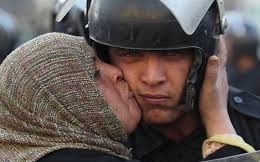Nearly five months after the uprising-cum-coup that ousted President Mohamed Morsy, Egypt is mostly calm.
That might seem surprising, especially given the reemergence of hundreds-strong protests following the military-backed government’s passage of a law restricting demonstrations last week, and the ongoing power struggle between the government and the Muslim Brotherhood, in which over 1,000 Morsy supporters have been killed. Just last week, Islamist protesters reached Tahrir Square for the first time since Morsy’s ouster this summer. But this is also the way most of Egypt has been for the past three years: Like the old Microsoft Windows computer game Minesweeper, the most explosive tumult typically occurs in small pockets, leaving the rest of the country safe, tranquil, and at times eerily quiet.
Egypt’s relative calm, however, should not be mistaken for stability. Far from representing the first step toward the better future that the “Arab Spring” once promised, it is an interlude — one that might endure, even if somewhat unsteadily, for a while, but which cannot last forever. That’s because Egypt’s emerging regime is trying to preserve this measure of peace by reestablishing the status quo ante — putting power back in the hands of the clans that supported Mubarak for decades, and which chafed mightily under Morsy’s rule. But the new regime has done nothing to address the factors that catalyzed the first uprising almost three years ago: It has no answer for Egypt’s still-dwindling economy and no strategy for incorporating or appeasing Egypt’s Islamists, who tasted power once and are unlikely to accept the current crackdown indefinitely.
The attempt to restore the Mubarak-era way of doing business reflects the nature of the coalition that backed Morsy’s removal in July. The most critical opposition to Morsy’s rule outside Cairo came from the large families and tribes in the Nile Delta and Upper Egypt, which comprised the Mubarak regime’s base and benefitted from its clientelist approach to politics.
“These traditional powers are the critical mass of voters,” Abdullah Kamal, a journalist and onetime official in Mubarak’s now-defunct National Democratic Party (NDP), told me. These clans, he continued, “had sympathy” for Mubarak, voted for Mubarak’s former Prime Minister Ahmed Shafik in the 2012 presidential elections, and would likely back Army chief Abdel Fattah al-Sisi if he runs for president.
For decades, these clans wielded substantial political influence. They were empowered by the Mubarak regime’s use of relatively small electoral districts, which allowed them to mobilize their family members and local supporters to win elections. And since Egypt’s parliament was largely a mechanism for distributing state resources, the clans typically used their electoral victories to deliver resources back to their districts and thereby entrench their local support. Following the 2011 uprising, however, the new electoral system entailed much wider electoral districts that diluted these traditional powers’ support. Meanwhile the Islamist parties rode their internal unity to overwhelming, nationwide victories.
While the details for Egypt’s next parliamentary elections will be determined by the government, it is widely anticipated that the next system will feature smaller districts that will re-empower the old tribal networks. Influential players within the Egyptian state are pushing for a system that would shrink electoral districts considerably.
“I participated in some of the discussions, and urged the adoption of an individual-candidacy system, because any other system forces us to have large districts, and we want smaller areas,” said retired Interior Ministry Gen. Mohamed Rifaat Qumsan, the man personally responsible for drawing Egypt’s electoral districts.
Qumsan, who previously served in the division of Egypt’s state security responsible for monitoring — and thwarting the political ambitions of — Islamists, admitted that the internal tribal make-up of each district is one of his key considerations when he’s drawing districts. “I know very well the geographic and social situation and tribes and families,” he said. “For example, if one big village has only one electoral box according to law, but it’s unsafe because people [from different tribes] clashed, I can make two boxes so they won’t clash.”
As a result, tribal leaders are once again key players in Egyptian electoral politics. Egypt’s non-Islamist parties are already planning to aggressively court them: For example, the Conference Party, founded by former Foreign Minister Amr Moussa earlier this year, is essentially a coalition of relatively small parties that managed to win seats in the last parliamentary elections in large part due to their tribal connections. And those parties with barely any popular support, such as the left-of-center Dostour and Egypt Social Democratic parties, are working through their clan-affiliated members to win key tribes’ support.
www.foreignpolicy.com

